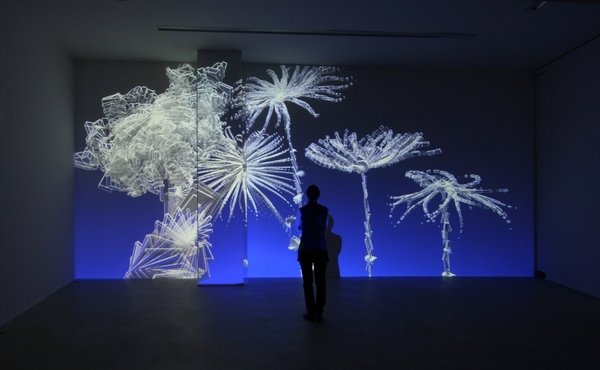Miguel Chevalier
dal 21/4/2009 al 2/5/2009
Segnalato da
21/4/2009
Miguel Chevalier
iMAL Center for Digital Cultures and Technology, Bruxelles
The Fractal Flowers exhibition presents his recent creations: virtual reality installation, silkscreens on plexiglass, 3D stereolithography sculptures, as much as possible materializations for his fractal flowers born from the same digital code. The works presented are part of a process initiated by the artist at the beginning of this decade under the title Other Natures.

"The Fractal Flowers presented at iMAL are part of a process initiated by Miguel Chevalier at the beginning of this decade under the title Other Natures. These works start from the observation of the plant
kingdom, and its transposition within a digital universe.
The titles of the first works in this series, Sur-Nature (2004), Ultra-Nature (2005) and Supra-Nature
(2006), evoke a surpassing of natural borders. The development process of these computer-generated coloured plants is in fact directed by a software developed especially for the artist. Miguel Chevalier and his team have created eighteen “virtual seeds”, allowing them to grow, blossom, die, and reborn
– giving birth to an infinite variety of forms. And although partially following certain parameters, the
growth of these digital flowers relies essentially on a random component, generated by the computer
program.
Aesthetically, Fractal Flowers differs from Other Natures by its conquest of the 3rd dimension: the result are flowers caught mid-way between organic and mechanic-robotic, of which the strange, even
menacing, aspect is moderated by the interactive control exercised upon them by the spectator.
As Lev Manovich has underlined, the distinctive characteristic of the digital work is to be based on a
code, susceptible to differ from interpretation according to the given software. This principle of variability is amply illustrated by the Fractal Flowers exhibition at iMAL: the same data are used to produce
interactive animations, printed images, or even three-dimensional forms, veritable “digital sculptures”
obtained by stereolithography.
Beyond their aesthetic and playful qualities, the Fractal Flowers question both the status of the work
of art in the digital era and, on a more poetical and metaphorical way, the stakes involved in genetic manipulation. Nothing can predict what these “fractal flowers” might produce, as they are infinitely free to
hybridize and reproduce."
Excerpt of the catalog written by Pierre-Yves Desaive
About Miguel Chevalier
Miguel Chevalier was born in Mexico City in 1959. Since 1985, he has been based in Paris, where he does
most of his work. He graduated from the Ecole Nationale Supérieure des Beaux Arts in Paris in 1980 and
went on to Ecole Nationale Supérieure des Arts Décoratifs. After graduating in 1983, he was awarded
the Lavoisier scholarship by the French Ministry of Foreign Affairs and studied at the Pratt Institute,
New York. In 1994, he served as artist in residence at the Kujoyama Villa, Kyoto, Japan.
Miguel Chevalier’s wide-ranging artistic vision has been shaped by a broad education and extensive
travel. Since 1982, his art has been dedicated to the exploration of technology. Taking references from
the history of art and reformulating them using computer tools, his works investigate the flux and networks that underlie contemporary society.
He is known internationally as one of the pioneers of virtual and digital art. His images are a rich source
of insights into ourselves and our relationship to the world.
Miguel Chevalier has developed and refined his highly individual approach over the course of numerous
solo and group exhibitions throughout the world. Major exhibitions and presentations of his work have
included: Centre Pompidou, Paris; the Carrillo Gil Museum, Mexico City; the Kwangju Biennale, Korea;
the IFM, Marrakech; the New Zendai Art Museum, Shanghai; the Glow Festival, Eindhoven; the Festival
des Bains Numériques # 3, Centre des arts d’Enghien-les-Bains; the Centro Cultural Itaú, São Paulo...
Image: Virtual reality installation
Opening: April 22, 18:00-23:30
iMAL, Center for Digital Cultures and Technology
Koolmijnenkaai 30 Quai des Charbonnages, 1080 Brussels
(metro Comte de Flandres/Graaf van Vlaanderen)
Opening Hours:
Wednesday-Friday: 2:00 pm-7:00 pm
Saturday and Sunday: 1:00 pm-7:00 pm
Admission Fees:
5 € / 3€ (students, unemployed)



